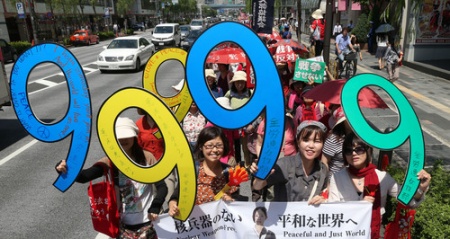Japan/Military
(Armed Forces) | |
|---|---|
The Japanese Self-Defense Forces(JSDF or SDF), also known as the Japanese Armed Forces, are the unified military forces of Japan. Re-founded in 1954 as a reorganization of the police force reserve, they are the continuation of the armed forces of Imperial Japan from before the surrender in 1945.
The role of the SDF is to combat both domestic and foreign enemies, and to achieve these ends, it was to be mobilized both for external defense and internal security. In this way, a military was revived in Japan, equipped with both a military function against foreign countries, and one to maintain domestic peace and order by fighting against the enemy within, i.e., the Japanese people themselves.[1]
Contents
Article 9
Article 9 of the Japanese Constitution is a clause in the national Constitution of Japan outlawing war as a means to settle international disputes involving the state. The Constitution came into effect on May 3, 1947, following World War II. In its text, the state formally renounces the sovereign right of belligerency and aims at an international peace based on justice and order. The Constitution was imposed by the United States in the post-World War II occupation period.[2].
The article also states that, to accomplish these aims, armed forces with war potential will not be maintained. Despite that, Japan maintains the one of the world's top 10 armed forces. The Japanese Self-Defense Forces, formally only defensive, does not have certain offensive weapons like ballistic missiles and nuclear weapons in its arsenal.
Korea
With the conclusion in 1960 of the new Japan-U.S. Security Treaty (a military alliance) as a start, the SDF’s external function was defined and strengthened. The focus of its external task was then directed towards the Korean Peninsula. With the conclusion of a Normalization Treaty between Japan and South Korea in 1965, the political, economic and diplomatic relationship between the two countries was strengthened. Strong resistance among the Japanese people against a direct military tie-up, however, necessitated that the South Korean military and Japan’s SDF continue their cooperation only indirectly, with the U.S. military as middleman.[1]
Re-militarization
In June 2014, Japan's ruling coalition adopted a resolution that — for the first time since World War II — would clear the way to the Japanese armed forces to defend the country’s allies in combat. Shinzo Abe justified this with reference to the "increasingly severe" security situation, and insisted that this was a defensive measure and that "There is absolutely no chance that Japan becomes a nation that wages war."[3] In May 2015, activists across Japan, including a group of around 500 people in front of the Prime Minister's office protested what they called the destruction of the Constitution's war-renouncing Article 9, as the cabinet was discussing this legislation.[4]
Turnkey Nuclear Weapons Program
Japan has 45,000 kilograms of plutonium stored, one of the world's largest stockpiles, enough to create more than 5000 nuclear weapons. Officially it is there with intention of generating electricity. But given Japan’s technological and scientific expertise, the government could create nukes within a matter of months.[5]
Japan also does not have long-range missiles, but it does have space-launch capabilities. If the government choose, it could probably build and deploy longer-range missiles armed with nuclear weapons in a similar time period.
Control of intelligence agencies
In March 2015, Japanese Prime Minister Shinzo Abe announced a plan to recreate Japan's intelligence agencies, using the UK's MI6 as a model. The Intelligence agencies were dismantled by the Allies after World War II. The rebuilding announcement follows territorial tensions with China and the be-headings of two Japanese hostages in the Middle East.
References
- ↑ a b https://timshorrock.com/2023/01/09/the-rise-of-japans-sdf/
- ↑ https://web.archive.org/web/20181204084031/https://edition.cnn.com/2016/12/06/asia/japan-military-pearl-harbor-anniversary/
- ↑ http://www.stripes.com/news/pacific/japan-reinterprets-constitution-can-defend-allies-in-combat-1.291389
- ↑ http://mainichi.jp/english/english/newsselect/news/20150515p2a00m0na017000c.html
- ↑ https://interactive.pri.org/2019/03/japan-nuclear/index.html
